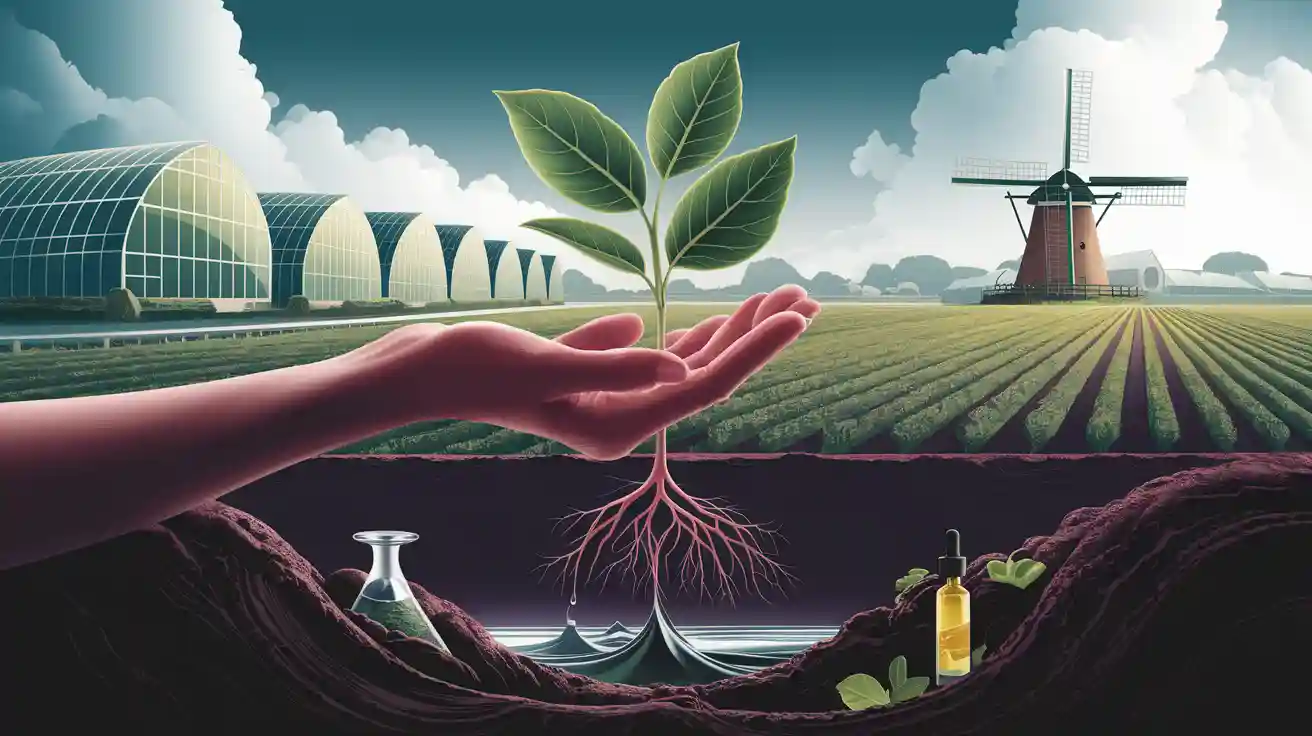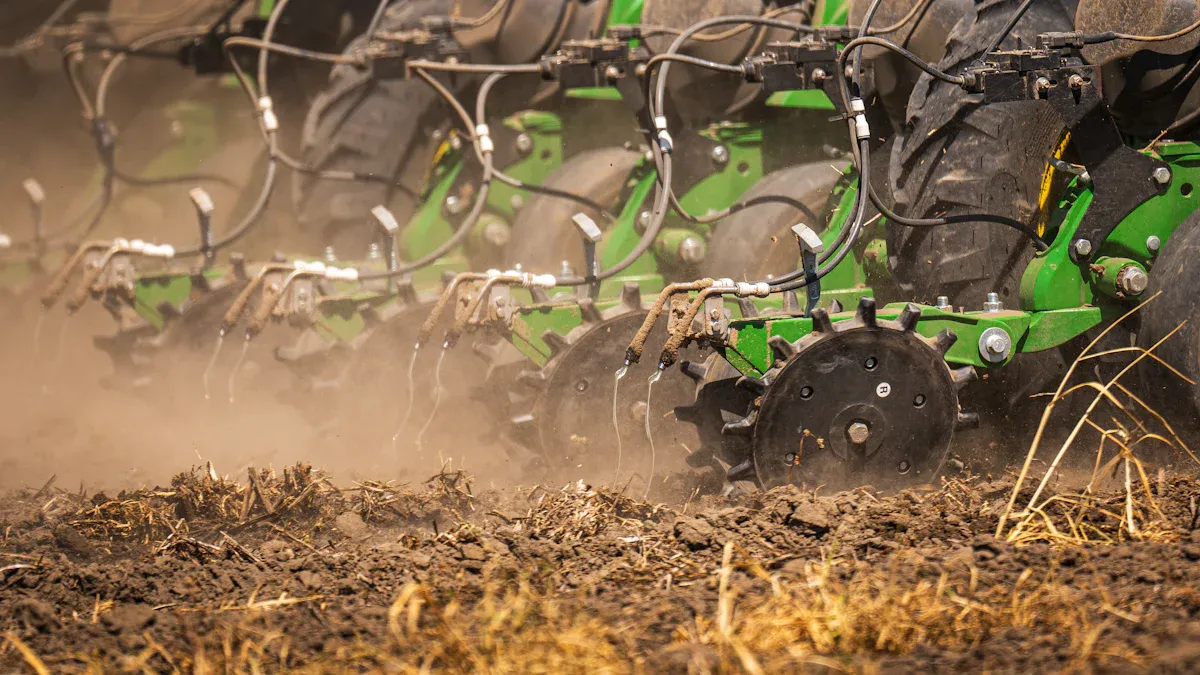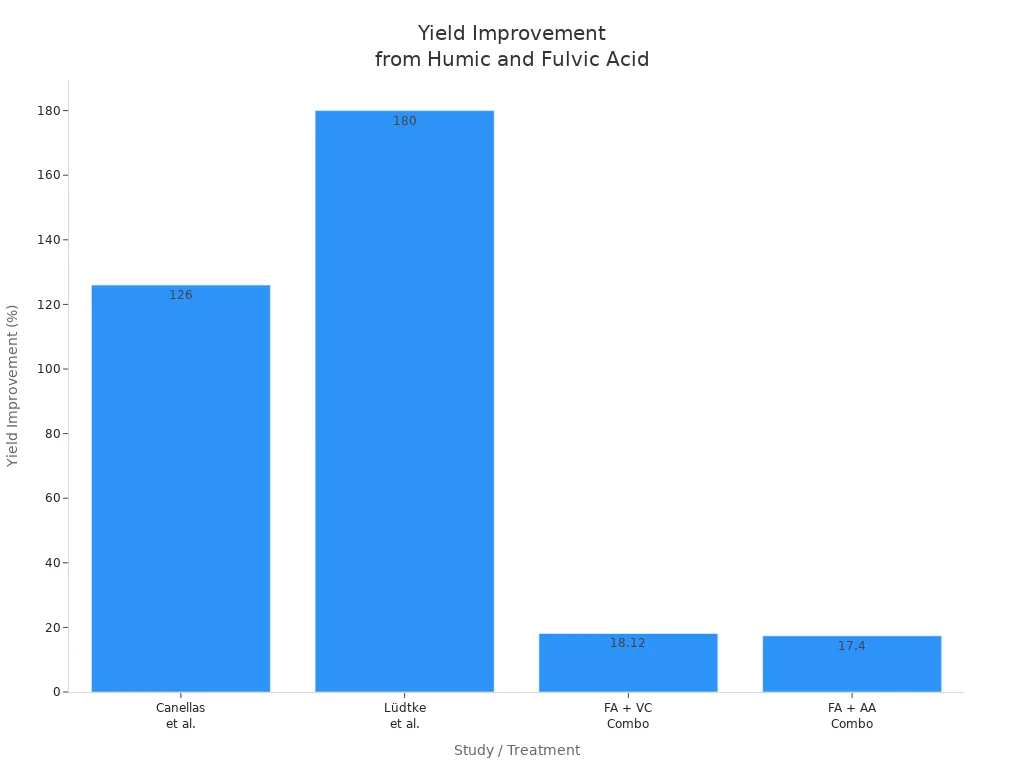Humic acid and Fulvic acid used in Holland

You see humic acid and fulvic acid help farming in Holland. Dutch farmers use these substances to make soil better. They also use them to help farming last a long time. Quality is important to you, so local makers and trusted Dutch brands choose top products. You notice the Netherlands is special for new ideas. They mix old ways with new methods in farming and growing plants.
Key Takeaways
Humic and fulvic acids make soil better. They help crops grow well in Holland. Local Dutch humic acids come from natural things. They are safer for the environment. Imported humic acids can be stronger. But they are not always pure. They might hurt the environment. Humic acids in fertilizers help plants grow bigger. They also make plants healthier. Fulvic acids help plants take in nutrients fast. This is important when weather is tough. Always look for product certifications. This keeps your farm safe and high quality. You can use humic and fulvic acids in soil. You can spray them on leaves. You can use them in irrigation. This gives the most benefits. Dutch farmers get better harvests. They use humic and fulvic acids in their farms.
Humic Acid Production in Holland

Local Products
Humic acids are made in the Netherlands using new and earth-friendly ways. Dutch companies use leonardite, which is a natural mineral, as the main ingredient. They process leonardite to make humic acid that meets high quality rules. Composting is also very important. Dutch composting centers turn organic waste into compost, mostly from city trash. Humic acids form by themselves during the composting process. Dutch companies sort biowaste at the start, so heavy metals and plastics stay out of the compost. This helps make cleaner fertilizers and protects nature. Some companies even get humic acids from drinking water, which is better for the planet and supports recycling ideas.
Tip: Buying local humic acids helps farms stay green and cuts down on pollution.
Imported Products
Imported humic acid products are also sold in the Netherlands. These usually come from other countries in Europe or from far away. Most imported humic acids are taken from lignite, which is a kind of peat, by using chemicals. These ways can hurt the environment and cost more to ship. Imported humic acids are often stronger but may not be as pure or green as Dutch ones. When you look at both, you see Dutch humic acids care more about safety and quality. Imported ones focus more on making a lot and saving money.
Product Type | Source Material | Production Method | Environmental Impact |
|---|---|---|---|
Local | Leonardite, peat, drinking water | Composting, recovery | Low |
Imported | Lignite, peat | Chemical extraction | High |
Specialty Fertilizer Integration
Dutch brands like Van Iperen are leaders in using humic acids in special fertilizers. These brands mix humic acids with other nutrients to make better products for farms and gardens. Special fertilizers have humic acid to help soil, give plants more food, and help them grow. You get better crops and healthier plants with these products. Dutch makers use peat and other natural things to make their fertilizers work even better. When you pick special fertilizers with humic acids, you choose smart ways to farm that help the earth.
Fulvic Acids and Quality Considerations
Supplier Variability
There are many suppliers of fulvic acids in Holland. Each one uses different materials and ways to make them. Some use local organic matter, while others bring in raw stuff from other countries. How fulvic acids are made can change how pure and good they are. Dutch suppliers often work hard to keep things clean and sort materials well. Imported fulvic acids sometimes come from places with less quality control. Some suppliers use new technology to get fulvic acids, which helps keep them safe for your crops.
When you pick fulvic acids, you should check the supplier’s reputation. Trusted Dutch brands give lots of details about their products. You can ask for lab reports or certificates to see how pure and strong they are. Some fulvic acids work well for organic farming, while others are for regular farms. You should look at the color, how well they mix in water, and the smell from different suppliers. These things help you choose the best product for your needs.
Note: Always check where fulvic acids come from and how they are made. This helps you avoid bad chemicals and get better results on your farm.
Product Standards
Dutch farms have high rules for fulvic acids. The Nova Humic line shows Dutch companies care about quality. These products use fulvic acids from natural breakdown of organic matter. You get fulvic acids that mix well with water, so you can use them in many watering systems. Water-soluble fulvic acids help plants take in food faster and make soil better. Dutch rules say fulvic acids must not have heavy metals or bad leftovers. You get products that help farms stay green and protect nature.
Dutch brands test fulvic acids to make sure they are pure and work well. You can find products with clear labels that show how strong they are and how to use them. Some companies have fulvic acids that follow organic farming rules. You should pick products that meet Dutch and European rules. These rules help you trust the fulvic acids you use on your farm. You can count on Dutch products to help your plants grow and make soil stronger.
Standard Feature | Benefit for You |
|---|---|
Water-solubility | Easy mixing and application |
Purity | Safe for crops and soil |
Certification | Meets organic farming rules |
Clear labeling | Helps you use the right amount |
You make better choices when you know the product rules. Fulvic acids that follow Dutch rules help you feel sure about your farm results.
Main Uses in Dutch Agriculture
Biostimulant Applications
Dutch farms use humic acids and fulvic acids as biostimulants. These help plants grow stronger and healthier. Humic acids go into the soil to help roots grow better. They also help plants take in more nutrients. Fulvic acids work inside the plant. They help plant cells use minerals and water well. Dutch farmers use these biostimulants to help crops during cold or dry times. They also help seeds sprout and young plants grow. You can put these on plants with water or spray them on leaves. This helps plants get better fast and recover from hard weather.
Experts in Dutch greenhouses suggest using humic acids and fulvic acids. These products make leaves greener, stems stronger, and flowers bloom more. Many Dutch farms use biostimulants to use less chemical fertilizer. This saves money and is better for nature. Using humic and fulvic acids is a smart way to care for crops.
Organic Fertilizer Role
In the Netherlands, humic acids and fulvic acids are key in organic fertilizers. These natural things make soil better and help it hold more food for plants. When you use organic fertilizers with these acids, plants get more nutrients. Fulvic acids help roots take in minerals. Humic acids keep water and food in the soil, so crops stay healthy even when it is dry.
Humic and fulvic acids make soil better by breaking down hard-to-use phosphates. This is important for plant growth. They help plants get more phosphorus and keep soil healthy. This is needed for farming that lasts a long time. Studies show these acids stop phosphate from turning into hard rocks. This means plants can use more phosphorus and other tiny nutrients. Adding humic acids with phosphorus fertilizer gives more water-soluble phosphate. This helps crops grow better and give more food.
Dutch farmers use these fertilizers to grow vegetables, fruits, and flowers. These products help farms follow strict organic rules. You do not need bad chemicals and you help nature. Humic acids in organic fertilizers keep soil healthy for a long time. Dutch farms using these fertilizers often get more crops and better quality.
Niche Market Focus
In Holland, humic acids and fulvic acids are used in special markets. Small farms and organic growers like these products because they are pure and work well. Dutch brands make special mixes for berries, herbs, and pretty plants. Fulvic acids are important in hydroponics, where growers control plant food closely. Humic acids are also used on sports fields and golf courses. They help grass stay green and fight off sickness.
Dutch sellers care about quality and where products come from. You can ask for lab tests and certificates before you buy. Special markets in Holland want products with clear labels and good results. People pick humic and fulvic acids to give safe and green food. Organic fertilizers with these acids help you do well in the busy Dutch market.
Benefits of Humic Acids in the Netherlands
Soil Structure
When you use humic acids in Dutch peat soils, you see big changes. These substances help make the soil strong for your crops. Humic acids stick small soil pieces together. This makes the soil loose and full of air. Roots can move through the soil more easily. Water moves better, so you do not get hard, packed soil. Using humic acids helps the soil keep its shape and lets plants grow well.
Humic acid helps soil pieces stick together and lets air in, making a good place for plants.
When soil sticks together better, water goes in faster and roots can grow deeper.
Humic acid stops soil from getting too hard, so roots can spread out and find food and water.
Your fields hold water better. This helps crops live through dry times and use water wisely. Humic substances help you take care of heavy Dutch peat soils. These soils need extra help to stay good for farming. Adding humic acids keeps the soil alive and working all season.
Nutrient Availability
You want your plants to use every bit of fertilizer. Humic acids help by making more nutrients ready in the soil. They help plants get nitrogen, phosphorus, potassium, and iron. How well this works depends on the kind of humic acid, how much you use, and the soil’s pH. For example, humic acids help cucumbers take in more iron. This is important in Dutch farms, where plants sometimes do not get enough iron.
Humic acids work with organic fertilizers. They break down food in the soil so roots can take it up fast. Plants grow stronger and leaves look greener when they get the right minerals. Humic substances also help plants get tiny nutrients they need to stay healthy. Using humic acids means your soil gives plants what they need to grow well.
Plant Growth
You see plants grow better when you use humic acids. These substances help plants make natural hormones like auxins and cytokinins. These hormones help roots grow, cells divide, and flowers bloom. Your crops grow faster and roots get stronger. Humic acids help plants deal with dry weather or salty soil. You see plants that are healthier and can handle tough times.
Humic substances help plants make hormones that help roots, cells, and flowers grow.
They help plants deal with things like dry weather and salty soil, making them stronger.
Humic acids help roots grow bigger, so plants get more food and water.
They help plants take in nutrients, especially nitrates, which are important for growth.
Using humic substances can help you get more crops and better quality by making soil richer and helping plants use food better.
You get more crops and better plants. Humic acids work well in Dutch peat soils, where you need to watch water and food for plants. Using humic products helps plants at every stage. It also helps your farm do well in the Dutch market, where good quality and caring for nature are important.
Application Methods
Soil Application
You can put humic acid and fulvic acid right on the soil. This helps the soil stay healthy and makes good microbes grow. Dutch farmers like this way because it helps crops grow strong. When you add humic substances, roots get food more easily. This works well in Dutch peat soils that need help holding water and swapping nutrients.
Mixing humic acids with compost or organic fertilizer gives better results. This mix helps the soil keep water and lets plants use more food. You can spread humic acid as granules or liquid before planting. Some Dutch farmers soak seeds in humic acid before planting. This helps seeds sprout fast and grow strong.
Tip: Putting humic acids in the soil helps for a long time. You make the soil better for crops every year.
Application Method | Effectiveness |
|---|---|
Soil Application | Helps soil microbes and humic compounds, which are needed for healthy soil and cannot be replaced by spraying leaves. |
Foliar Use
Foliar use means spraying humic acid or fulvic acid on leaves. This way works fast when you want quick results. Plants take in food through their leaves, so sprays work quickly. Dutch farmers spray leaves when plants are stressed by dry or cold weather. Spraying helps plants get better and grow more.
Spraying leaves does not take the place of putting acids in the soil. It helps plants grow but does not fix the soil. You should spray leaves when plants need extra help. Many Dutch greenhouses use this to keep leaves green and flowers blooming.
Common ways Dutch farmers use humic acids:
Soaking seeds to help them sprout and grow evenly
Spraying leaves for fast food uptake
Application Method | Effectiveness |
|---|---|
Foliar Use | Can help plants grow but does not give the soil the same benefits as humic compounds. |
Irrigation
You can add humic acid and fulvic acid to water for irrigation. This spreads the acids all over the field. Dutch farmers use irrigation to save water and time. Mixing humic acids with irrigation helps roots get food every time you water.
Irrigation works well for big fields and greenhouses. You can use drip lines or sprinklers. This does not replace putting acids in the soil, but it helps feed plants. You should check how much humic acid is in your water to avoid wasting it.
Application Method | Effectiveness |
|---|---|
Irrigation | Not directly compared, but healthy soil is most important for good crops. |
Note: You get the best results by using soil application, foliar sprays, and irrigation together. Each way helps plants in its own way. Pick the method that works best for your farm and crops.
Regulations and Standards
Dutch Guidelines
You have to follow strict rules in Holland. These rules keep your crops, animals, and nature safe. The government checks products before you use them. This helps you trust what you buy for your farm.
Dutch rules focus on safety and purity. You cannot use products with heavy metals or bad chemicals. Holland follows European Union laws, so standards are high. The Dutch Food and Consumer Product Safety Authority (NVWA) checks fertilizers and soil helpers. They make sure products do not hurt people, animals, or the earth.
There are also rules for animal feed. The European Union made Regulation (EC) No 1831/2003. This law covers additives in animal food. Humic substances can be used instead of antibiotics in animal feed. You must follow these rules if you use humic acid or fulvic acid for animals.
NVWA checks fertilizers and soil helpers for safety.
You cannot use products with heavy metals or unsafe chemicals.
Regulation (EC) No 1831/2003 covers humic substances in animal feed.
Note: Following Dutch rules helps you protect your farm and animals. You also keep nature safe and avoid legal trouble. Your products stay trusted in the market.
Certification
You need to look for certification when you buy humic acid and fulvic acid. Certification shows a product meets Dutch and European standards. Certified products prove they are safe, good quality, and work well. You can ask your supplier for certificates before using any product.
Dutch authorities and labs test these products. They check for purity, heavy metals, and bad leftovers. Certified products have a label or code. You can use this to see where the product comes from and check test results. Many Dutch brands offer certificates for organic farming. These show the product fits organic rules and does not hurt nature.
Certification Type | What It Means for You |
|---|---|
NVWA Approval | Product is safe and legal in Holland |
EU Organic Certificate | Product fits organic farming rules |
Lab Test Certificate | Product is pure and free from toxins |
You should always check for these certificates. Certified products help you grow healthy crops and strong animals. You also show buyers you care about safety and quality.
Tip: Ask your supplier for certificates before you buy. Certified products help you follow Dutch rules and build trust with buyers.
Results and Case Studies
Farm Success Stories
Dutch farmers get real results with humic acid and fulvic acid. Many growers say their harvests are bigger and crops look better. Iceberg lettuce farms in Holland have shown great changes. When farmers spray humic acid on leaves, the lettuce gets much heavier. The fresh weight can go up by more than 100%. If you use fulvic acid with NPK fertilizer, you get even more lettuce. Some farms mix fulvic acid with vermicompost or amino acids. These mixes help plants grow stronger and make more food.
Study | Crop | Yield Improvement | Method of Application |
|---|---|---|---|
Canellas et al. | Iceberg Lettuce | 126% (fresh weight) | Foliar application at 3.1 g/m² |
Lüdtke et al. | Iceberg Lettuce | 180% (aerial mass) | FA + NPK treatment |
FA + VC Combination | Iceberg Lettuce | 18.12% | Combined application |
FA + AA Combination | Iceberg Lettuce | 17.4% | Combined application |

The chart shows that using these acids gives much bigger harvests. Dutch farmers trust these ways because they see more lettuce and better crops. They also notice greener leaves and stronger roots. These results help Dutch farms do well and meet tough quality rules.
Tip: Try using humic acid and fulvic acid with your normal fertilizer. You might see your plants grow faster and get bigger crops.
Research Data
Dutch scientists study how humic acid and fulvic acid help soil and plants. They found that changing the soil’s pH changes how much humic acid works. If you make the pH higher, you get more humic acid in the soil. Fulvic acid stays the same, even if the pH changes. If you lower the pH, humic acid goes down, but fulvic acid does not change.
pH Level | HA Fraction Change | FA Fraction Change |
|---|---|---|
Increasing | Significant Increase | Remains Constant |
Decreasing | Decrease | Remains Constant |
You can use this science to make your soil better for crops. Dutch research shows humic acid helps soil structure and helps plants take in food. Fulvic acid keeps plants healthy, even when soil changes. You can trust these facts to help you make good choices for your farm.
Note: Dutch research proves humic acid and fulvic acid help you grow more food and protect nature. Using science helps you make smart choices for your farm.
You can see Holland is a leader in using humic and fulvic acids. Dutch brands care about quality and clean ways to make products. They use smart ideas to help farms. These acids keep soil healthy and help crops grow well. The Netherlands is known for new farming ideas:
Description | |
|---|---|
Nutrient Transporter | A natural product from the Netherlands that helps plants take in more nutrients. |
Soil Health Improvement | Using humic and fulvic acids keeps soil healthy for a long time and helps the earth. |
Growth Acceleration | This product helps plants grow faster, so you get more crops and waste less food. |
You get many good things from these acids:
They help plants keep making energy, even when it is dry.
They help plants use their own hormones to stay healthy.
Dutch new ideas and strong rules help your farm stay green and grow more food.
FAQ
What is the difference between humic acid and fulvic acid?
Humic acid has larger molecules and works mainly in the soil. Fulvic acid has smaller molecules and moves easily into plants. You use both to improve soil and help crops grow.
Can you use humic acid and fulvic acid in organic farming?
Yes, you can use both in organic farming. Dutch products often meet strict organic standards. You should check for certification before you apply them to your crops.
How do you apply humic acid and fulvic acid on your farm?
You can mix them into soil, spray them on leaves, or add them to irrigation water. Choose the method that fits your crops and farm setup.
Are humic acid and fulvic acid safe for the environment?
Dutch brands make these products with clean methods. You protect nature when you use certified products. Always check labels for safety and purity.
How do you know if a product is high quality?
Look for clear labels, lab test certificates, and Dutch or EU organic certification. Trusted suppliers give you all the details you need.
Can you use humic acid and fulvic acid together?
Yes, you can use both together. You get better results when you combine them. Humic acid improves soil, and fulvic acid helps plants take in nutrients.
What crops benefit most from humic and fulvic acids?
You see strong results in vegetables, fruits, flowers, and turf. Dutch farms use these acids for lettuce, berries, herbs, and grass on sports fields.
See Also
Exploring Fulvic Acid Uses Across Spain's Agriculture
Understanding Humic Acid Advantages and Its Application in Australia
The Significance of Humic Compounds for Soil and Plant Vitality
Defining Fulvic Acid: Its Uses and Applications Explained
Identifying Canadian Plants That Require Humic Acid for Growth
